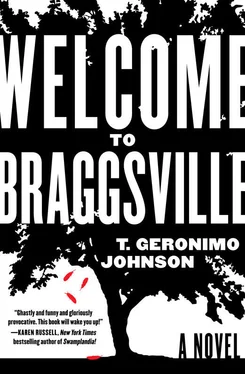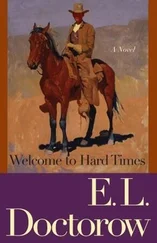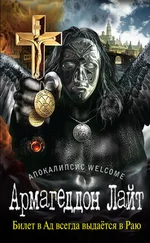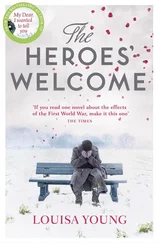But that morning it wasn’t working on Daron, who was thinking, If you hadn’t been fucking around interviewing and taking photos, you wouldn’t have tipped off my parents.
Can we pay now?
Daron left a larger tip than usual, and covered his plate with his napkin to hide that he hadn’t eaten the food.
THEY DROVE BACK IN SILENCE. Charlie suggested they only do interviews, but no one responded. Daron said they didn’t have to prove anything to anyone, to which Candice replied, We sure don’t. You’re proving it to us.
I told you, just because we’re from Georgia doesn’t mean we had slaves. My family never had slaves.
Neither did mine.
Even if we did, Harvard had that Moor, and no one complains about him.
I wish my family had slaves. In fact, I want them to bring that shit back. Maybe I’ll convince some people of that today.
When they reached the south side of Old Man Donner’s field, Charlie remained in the Bronco staring at the floorboards. Louis got out, tossed his oversize duffel decorated with Fu Manchu mustache patches on his shoulders like a drunken friend, and started walking without a word up the hill. After a moment, Candice turned and followed him. Daron and Charlie would return to the Davenports’ home and wait for full sun before driving downtown to do the interviews. It was early yet, and they had at least two hours before the detachment reached the nearest ridge, the point from which the troops would be able to see the tree planted by Bragg himself to commemorate his 1864 speech on freedom, the giant poplar under which Louis and Candice would stand dressed as slaves.
¿Por qué?
Why did YOU go along with it? Because she spoke Spanish to the guard at the Mt. Olivet cemetery who, once informed of her plans, mucho gustoed all the brochures she wanted plus one plaque that danced between your spooked fingers like a shekel that still smelled of the mint. Because her great-grandfather was from near here, and could have been Ishi. Because to be one-eighth anything is to be one-eighth everything.
Because she spent three weeks ex-libris-ing the Doe Library, the Morrison noncirculating collection, the Gardner stacks, Moe’s Books, et al., reappropriating Alfred Kroeber anthropology tomes until her shallow-bellied, two-burger hibachi sat ripe with enough ash to satisfy an urn (and she was nearly ticketed for that final cookout on the dorm balcony, all 448 pages of The Nature of Culture and all 243 pages of Mrs. Kroeber’s Ishi in Two Worlds, but let off with a warning after she explained to Officer Hernandez, again in Spanish, what she planned to do).
You lounged on the beanbag, amused. You surreptitiously recorded the contact — as you called it — on your phone. But, you, you tried backing out then, packing while watching Hernandez whistle down Haste Street, miraculously absent that common cop accoutrement, you. And you, you who had spent Officer Hernandez’s entire visit seated on the tub lip or the toilet or listening at the door or inspecting the medicine cabinet, packed your bag even as she explained there was no crime, no law, no injunction against conspiring to dispose of simulated human remains. You and you said nothing, both equally skeptical of the possibility of success. You later relented because, truth be known not even to you, she also cried a little, expressed regret for her insensitivity, for forgetting that they all, except you, had very different relationships with cops (which you did, because, more than anything else, you were polite). And you, whose mom cried you a river that floated you right out of going to Howard, had no levee system, locks, canals, or channels to rout or reroute people in distress, your father had always warned you not to let your heart become, A bay for broken-down boats.
But on that day, the day Hernandez arrested no one, when Candice informed you that you could not walk out, you answered by way of tightening the straps on your pack. You added, Candyland, he can moonwalk out, and we’re his backup dancers. And YOU left. At the corner, YOU parted, ostensibly for campus points distant. Thirty minutes later you returned, Just in case. YOU collided in the elevator. You told them you knew they were going back, and you couldn’t let them go alone. You told them you knew they were going back, and you couldn’t let them go alone. And you told them you knew they were going back, and you couldn’t let them go alone.
Besides, she had a plan, and compelling raisons d’état, and, The First Peoples did, like, get kinda screwed, you know.
For nearly 300 years white Americans, in our zeal to carve out a nation made to order, have dealt with the Indians on the erroneous, yet tragic, assumption that the Indians were a dying race — to be liquidated. We took away their best lands; broke treaties, promises; tossed them the most nearly worthless scraps of a continent that had once been wholly theirs. But we did not liquidate their spirit. The vital spark which kept them alive was hardy.
— Hon. John Collier, Commisioner, Bureau of Indian Affairs Annual Report of the Secretary of the Interior for the Fiscal Year Ended June 30, 1938
FOUR YEARS LATER
Our job is to work with you toward making this place a truly happy place where individuals and families will be giving themselves utterly to the community and winning a reward of inward power and inward joy — Greater than anything external in the whole world.
. . I am satisfied in my own mind, and we of the Government are satisfied that this colony, as the months go on, is going to provide a democracy of efficiency and the splendor of cooperative living.
— Hon. John Collier, Director, Poston Japanese internment camp, Colorado River Indian Reservation, Arizona, June 27, 1942
She was the last of the colonies — Lucky Thirteen, founded in 1733 by social reformer John Oglethorpe [with the intent to resettle imprisoned debtors] as a buffer zone of stalwart British farmers with which to stave off invasion from the Spaniards to the south. Slavery therefore was outlawed as a threat to civic morale and military readiness. Nor were Roman Catholics allowed: too many already polluted Florida (with their pagan rituals, though legitimated by biblical text, only one remove from native bloodlust). Nor could homesteaders claim more than five hundred acres. Nor was alcohol allowed (until 1742), being as it was a source of sloth. (Most grumbling was in response to the involuntary abstinence, and, of course, the absence of slavery, because it so clearly bestowed unexampled economic grace upon the other Southern colonies.)
The capital was to be Savannah, formerly known as Yamacraw Bluff, where Oglethorpe and his men planted stakes with the blessings of Chief Tomochichi. According to the standing agreement, there were to be no further settlements south of the Carolina border; however, in the chief’s eyes, there was more than enough land for the one hundred Yamacraw Indians and the one hundred and fourteen settlers.
After the Salzburgers’ and Scots’ antislavery petitions drowned in the wake of Oglethorpe’s return to England; after the royal decree legalizing slavery (1751); after the first American Revolution, the land rush, the Pine Barrens Speculation (1789–1796), the Combined Society, and the Yazoo land fiasco (1794), a spectacular disaster; after Indian agent Col. Benjamin Hawkins’s patient negotiations with the Creek and Cherokee and Muscogee Nations were compromised by the Red Stick Revolt, which saw Andrew Jackson’s near spontaneous ascension by saber; one Raymond Bragg pushed north to make his fortune in the heart of the state, complaining at every turn to any who would listen that he didn’t understand why such hard-won independence hadn’t earned a new name for the growing state whose every legal document echoed the colonial past, bearing across the masthead the name of a long-deceased monarch. Bragg traced his heritage back to the original Oglethorpe one hundred and thirteen who braved the dangerous crossing aboard the Ann, and considered it his duty, honor bound, to do proud that Georgia lineage. And he had, as a young man fighting alongside Old Hickory himself, as Jackson would soon be known, in the battle of Negro Fort (1816) and again in the First Seminole War (1817–1818).
Читать дальше
Конец ознакомительного отрывка
Купить книгу












